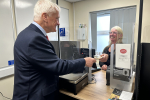I am writing at a crucial moment for the future of health services across Holderness. Supported by Hornsea Hospital League of Friends, Withernsea and District Health Forum, the local GP practices, and thousands of individual residents, I am proud to lead the Holderness community as we fight to stop the CCG’s plans going ahead. We do not believe local health services will be improved by the closure of the MIU at Hornsea nor by the loss of both beds and the MIU in Withernsea.
The CCG’s plans, if we cannot stop them, would abolish all minor injury care at Hornsea Cottage Hospital and would severely curtail urgent treatment at Withernsea Community Hospital. The proposed revised 8am-8pm opening hours at Withernsea would only allow for one urgent care appointment per hour, and would still see the community beds at the hospital shut for good. Local people are clear that they want services to be maintained in the towns and not centralised elsewhere.
The Minor Injuries Units and community beds have been strategically placed in Holderness to cater for a population that is generally sparser, older, and which experiences a higher prevalence of long-term illnesses such as cancer and arthritis, than other areas overseen by the CCG.
Under the CCG’s proposal, patients across Holderness would be required to travel as far as East Riding Community Hospital in Beverley, Hull Royal Infirmary or Bridlington for urgent care appointments.
Holderness residents’ reliance on their MIUs is intensified by the low levels of car ownership and poor public transport links, which would require some patients in Withernsea, for example, to make multiple bus journeys to seek care.
Further concerns can be found with the CCG’s attitude towards the community beds at Withernsea Hospital, which face permanent closure and which have had admissions suspended recently due to ongoing staff shortages. The CCG has said they want to shift the focus of care services towards treatment at home and, where necessary, using beds in existing care homes.
We are concerned at the practicality of these proposals. Where exactly will such beds be commissioned? Will they be sufficient given there are around 4000 households in the area where a least one occupant suffers from long-term health problems or has a disability? Should we really expect often elderly and infirm spouses to have to travel further to see their loved ones?
The issues surrounding the CCG’s proposals go back to its public consultation, opened in 2016, which was thoroughly unfit for purpose. At no point did the CCG give the option of retaining the status quo, and instead presented four differing – but equally unacceptable – combinations for their new urgent care centres in Beverley, Goole or Bridlington. This gave a lot of us the impression that the CCG was not genuine in listening to residents’ concerns.
What has been heartening has been the strength and conviction of local people politely but firmly coming out in their hundreds to the rallies and public meetings we have organised. More than 11,500 people signed the petitions which I presented to the CCG.
Sir Greg Knight MP and I met the Secretary of State for Health and impressed upon him the strength of local feeling about the CCG’s plans. I was delighted that he agreed to refer the CCG’s decision to the Independent Reconfiguration Panel (IRP), whose initial assessment of the case is due any time now. If the IRP finds further cause for investigation, and grounds for a possible reversal of the CCG’s plans, the Secretary of State may instruct the IRP to carry out a full review of the CCG’s plans.
We should know the result very soon. Residents deserve to be listened to and I commend local campaigners who have so persistently made the case for continued local healthcare and done so with energy and verve.


